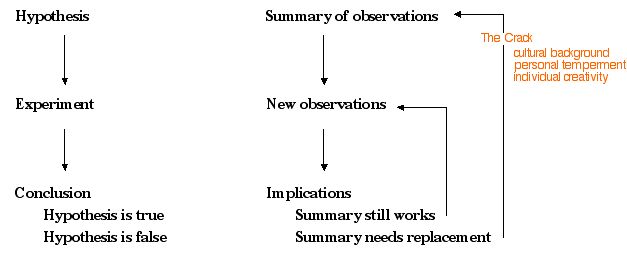Remote Ready Biology Learning Activities has 50 remote-ready activities, which work for either your classroom or remote teaching.
Serendip is an independent site partnering with faculty at multiple colleges and universities around the world. Happy exploring!
| A traditional perspective | A loopy story telling perspective |
|---|---|
 | |
| Science as body of facts established by specialized fact-generating people and process
Science as successive approximations to Truth
| Science as process of getting it less wrong, potentially usable by and contributed to by everyone
Science as ongoing story telling and story revision: repeated making of observations, interpreting and summarizing observations, making new observations, making new summaries ... individually and collectively Science as skepticism, a style of inquiry that can be used for anything, one which everybody is equipped to to/can get better at/be further empowered by, and contribute to - a way of making sense of what is but even more of exploring what might yet be |
|
| If science is as much about creation as discovery then the "crack"is a feature, not a bug ... and differences among people are an asset to the process rather than a problem or an indication it isn't working |
Scientific stories are frequently efforts to summarize the widest possible range of observations, always motivate new observations and hence new stories, should never be understood as "authoritative" or "believed in", do not compete with or invalidate other stories.
Key issues about scientific stories
|
Which of the following stories do you prefer?
Loopy story telling science is a tool to help one become better at thinking for oneself
Your thoughts? ... science as fact or story telling?
|
The "get it wrong" instead of "get it right" contrast has some problems
Originally used for BMC summer research students (See "Right" and "Wrong" in Science (and Elsewhere) for student comments, continuing conversation), slightly modified and used for BMC science for college program (high school students) 26 June. Played up "multiple stories" side more, noting observations change stories but (sun/earth) stories can co-exist, be chosen among for different reasons. Ditto re evolution. Cleaner distinction between "disproving" stories (not for any of evol possibilities) and choosing among them. See student thoughts. Emphasized science as "loopy", went on to brain as loopy. Nice parallel emerged: brain as explorer, tester of models, multiple stories in science for same set of observations, ditto ambiguous figures. Story teller as way of acknowledging/making use of ambiguity. |
| About Serendip | Forum
About Serendip | Forum List |